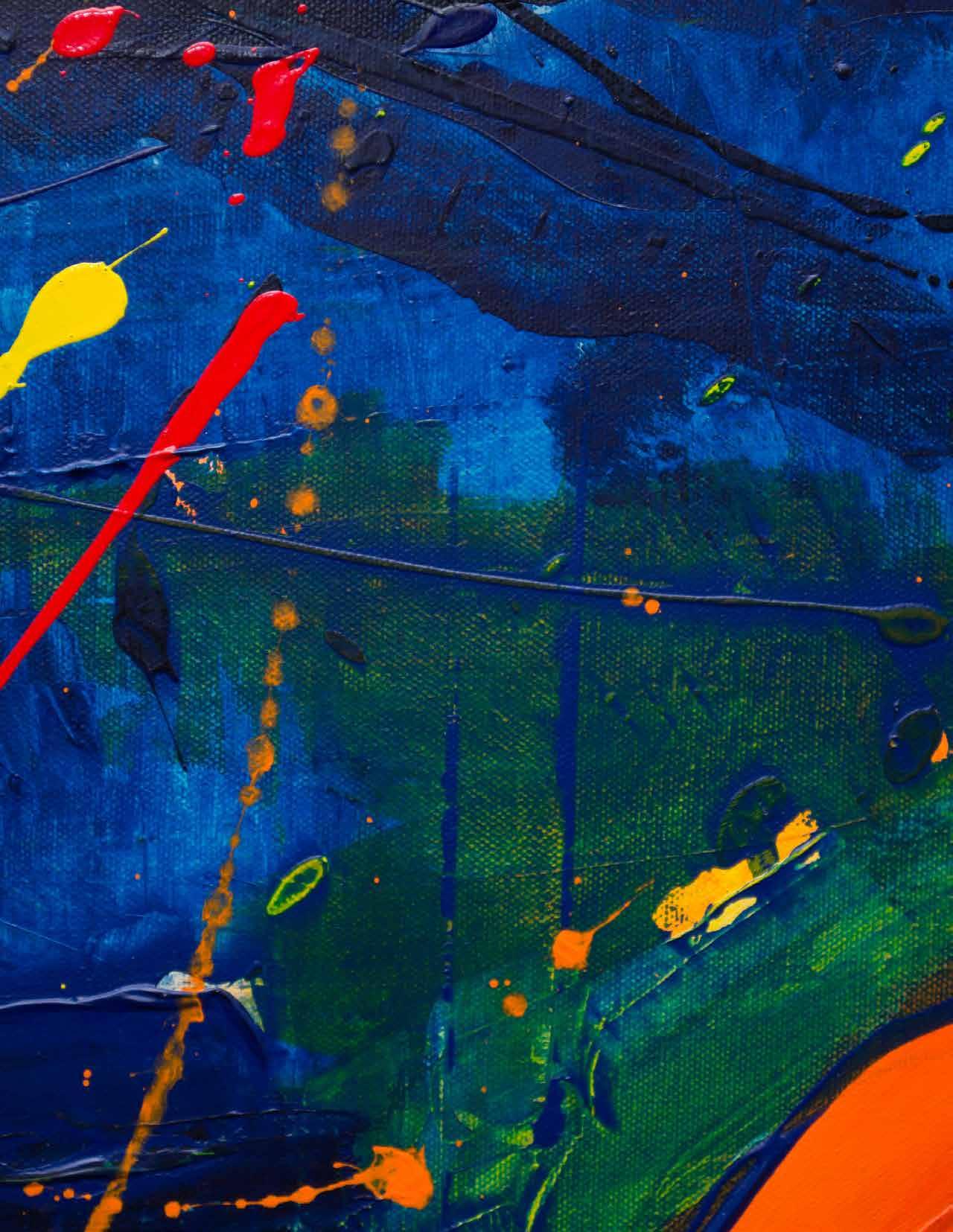2023 Progress Report


The Gottingen Street Neighbourhood Shop and Every One Every Day Kjipuktuk (EOED) exists in Halifax North, which is situated on Mi’kma’ki, the ancestral and unceded territory of the Mi’kmaq. Oral histories, supported by written evidence and artifacts, tell us that the Mi’kmaq have occupied this territory for over 13,000 years.
Mi’kma’ki is covered by the Treaties of Peace and Friendship, which the Mi’kmaq, Wolastoqey, and Peskotomuhkatiyik Peoples first signed with the British in 1726. These treaties did not implicate or affirm the surrender or transfer of lands and resources to the British but recognized Mi’kmaq and Wolastoqey title and set the rules for what was to be a long-standing relationship between nations, initially preventing war and facilitating trade.
For the Mi’kmaq, these treaties are revered as legal covenants. These sacred pacts are the foundation of Mi’kmaq - Euro-Canadian government relations and we all, as treaty people, must recognize
and appreciate their legitimacy if we are to truly acknowledge the presence of the Mi’kmaq—past, present, and into the future.
This land acknowledgment is a commitment to build upon as we recognize that such statements are inconsequential without meaningful action toward reconciliation.
THE SPIRIT OF RECONCILIATION IS IN RELATIONSHIPS. WE MUST NURTURE THE SPIRIT.
Msit no’kmaq is a Mi’kmaw term meaning, “All my relations”. It signifies a respect for the interconnectedness that exists among us, with our surrounding environment, and with the sacredness of Mother Earth and all the gifts of creation.
We invite all our partners and contributors to consider Msit no’kmaq as we move forward together in creating healthy and sustainable communities that support an ecosystem of participation and foster mutual respect and understanding.



Every One Every Day Kjipuktuk / Halifax has a big ambition:
To build a new system of neighbourhood participation that is reconciliation focused and inclusive to all—where a new foundation for civic and social infrastructure is built upon relationships between people, nature, and place, and where residents can actively contribute to a more reconciled future for all.
To measure the value that is co-created by growing a network of participation and establish its viability as a long-term pathway for building neighbourhoods and cities that are happier, more resilient, and socially connected.
Weaving Truth and Reconciliation into the design of civic and social infrastructure. The journey of Reconciliation is rooted in relationships and honouring processes of truth and healing. So, we must create systems designed for this very thing—relationships between residents, organizations, and governments – first to build understanding across our ways of being and knowing, and to shift mindsets, systems and structures to not only account for these differences, but also to honour them through the ways we live and learn in society together. Every One Every Day Kjipuktuk creates opportunities to bring Reconciliation to life across neighbourhoods—through enhancing Indigenous identity and belonging in the urban context, and building new relationships that are about learning, and fostering harmonious interactions with each other and the places we call home.
Creating conditions for people and institutions to collaborate.
Every One Every Day is creating robust social infrastructure that has potential to transform people’s lives and the neighbourhoods in which they live. The urgent challenges of our time require new systems and structures that empower local people to contribute local solutions, as they are uniquely positioned to do. And with an ecosystem of local, national and international actors, to nurture new models of stewardship and shared ownership that make way for cities not designed for populations, but for generations—past present and future. This work can’t be done alone; But rather, it will take the minds and hearts of many—there is no other way.
Placing people at the heart of neighbourhood development.
The relationships we build everyday matter; And what we do together everyday matters too. Every One Every Day Kjipuktuk creates infrastructure for weaving the diverse threads of our communities together, through spaces designed for bridging— where neighbours can meet based on shared interests and build new relationships with one another and with place. It puts residents at the heart of decision making, where they have the tools and supports necessary to work together daily on practical and creative projects that help to shape the kind of neighbourhoods they wish to live in and are about thriving in a more prosperous future for all.
Co-created & cooperative communities that invite the participation of everyone and create opportunities for building shared lives.
GUIDING QUESTION: How can we build a support platform that cultivates social cohesion and creates opportunities for building shared lives?
The Every One Every Day support platform creates opportunities for residents from diverse cultures to encounter others and share common experiences by engaging in everyday meaningful participation. As a result, feelings of similarity across lines of difference are cultivated and residents become more open to connecting around more inclusive shared identity, such as coming together around shared values and active citizenship.
Engaging in opportunities for building shared lives requires disparate communities to work together; Communities that may otherwise have little support to cooperate, to identify and work towards larger shared goals, and participate in collaborative action on issues of shared concern. Bridging differences and fostering positive intercultural relationships over time will establish and support co-created and cooperative communities, for the long term.
The Circle of Change demonstrates the pathways identified to achieve the shared goals and overall impact of Every One Every Day Kjipuktuk, ‘Co-created and Co-operative Communities’.
The circle represents a cycle that flows continuously and reminds us that if we put out good energy, it will come back to us. Nukumi, the grandmother of Kluscap (a cultural hero of the Mi’kmaq), is placed at the center of the circle, signifying the Indigenous knowledge and wisdom needed to surface truth and center our work in the process of reconciliation and healing.
Building & connecting inclusive social infrastructure that cultivates social cohesion and facilitates action towards Truth and Reconciliation at the neighbourhood level.
GUIDING QUESTION: What new forms of social infrastructure can enable processes of decolonization and be a catalyst for Truth and Reconciliation at the neighbourhood level?
Social cohesion is not an endpoint but rather a dynamic state that fluctuates with relationships and attitudes. Creating space and opportunity for residents to interact and gain knowledge of other cultures, perspectives, and practices is a critical step in establishing and maintaining social cohesion. Connecting these spaces across neighbourhoods and communities creates a sense of interdependence and allows for greater civic engagement. Further, these interactive spaces can facilitate transformational learning for both Indigenous and non-Indigenous residents when it comes to understanding personal and collective action towards Truth and Reconciliation.

The Mi’kmaw Native Friendship Centre is leading the vision of a new, landmark facility that has the potential to shape how we live and learn together across Kjipuktuk and beyond. The new Wije’winen Centre will be a central hub in the heart of the city that serves as a beacon for Truth and Reconciliation in the urban context; One where people can come together to learn about the history and culture of First Nations, Inuit and Métis peoples, and renew their connections to the natural world that surrounds them.
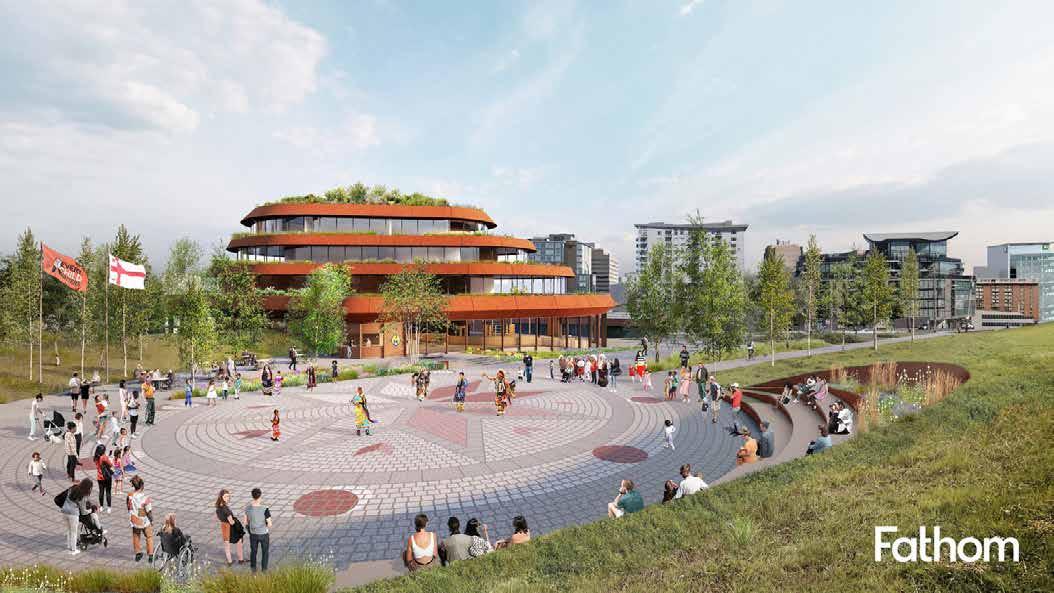
The new Centre will embody a unique form of social infrastructure that extends open invitations to residents and visitors from around the world to come and explore. Above all, it will be a place
of personal and communal connection to culture for urban Indigenous residents and will continue to provide social-based programming for First Nations, Métis, and Inuit residents living in Kjipuktuk (Halifax). Once completed, the new Wije’winen Centre will become a part of the Every One Every Day platform and support the growing network of participation throughout the city.
As Every One Every Day grows, it carries the Spirit of the Wije’winen Centre into spaces that extend beyond any one place, but within and across the social fabric of our communities and neighbourhoods.
An invitation to learn together, in a good way
The Neighbourhood Shop provides an inclusive space for Indigenous-led learning hosted by residents from the urban Indigenous community and staff members of the Mi’kmaw Native Friendship Centre. As an integral part of the Support Platform, the Shop contributes a safe and welcoming space for anyone wanting to learn and ask questions about First Nations, Métis, and Inuit culture, and provides an opportunity for urban Indigenous residents to share their talents, skills, and knowledge.

Photo, left: A rendering of the planned new Mi'kmaw Native Friendship Centre.
Photos, below: Neighbours make sealskin bracelets during an Inuit culture session, the Truth and Reconciliation Library at the Neighbourhood Shop.
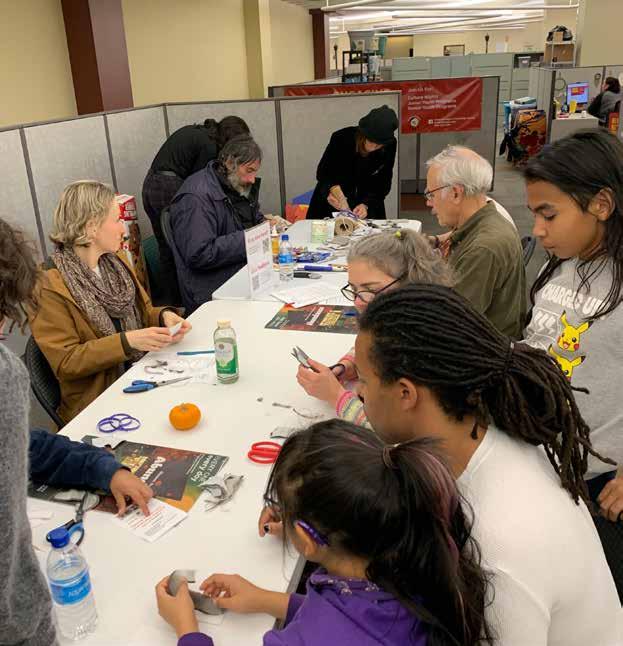
Every One Every Day Kjipuktuk shows potential to embed Truth and Reconciliation learning and action into neighbourhoods, and across communities. Thus far, our exploration into this potential has surfaced three areas of focus:
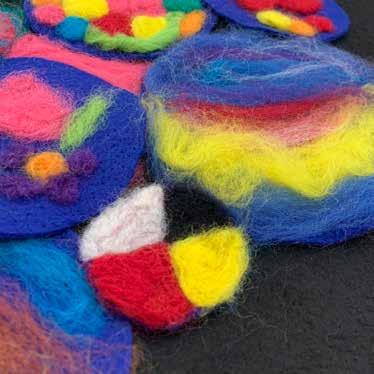

• Building shared understanding and language across the team and grounding our efforts in learning.
• Understanding our unique pathways and approaches – developing ‘Kokum’: A Truth and Reconciliation framework.


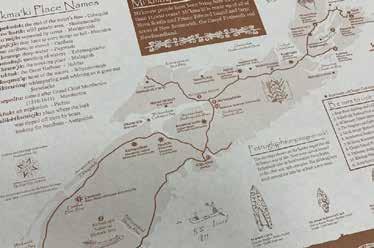

• Identifying ways to communicate & demonstrate Every One Every Day as a Truth and Reconciliation initiative.
Photos, top to bottom: A map of Mi'kmaq place names, sacred medicines, fiddleheads, a felted medicine wheel, a host makes Haudenosaunee strawberry drink during a session, sewing a medicine bag during a session, Operations Manager Richelle teaches about land acknowledgments.
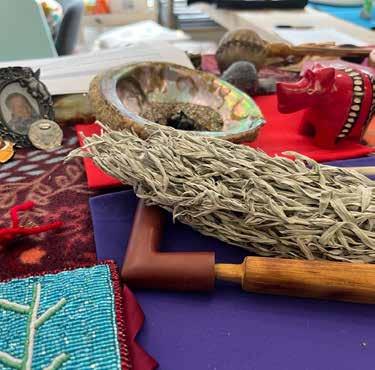
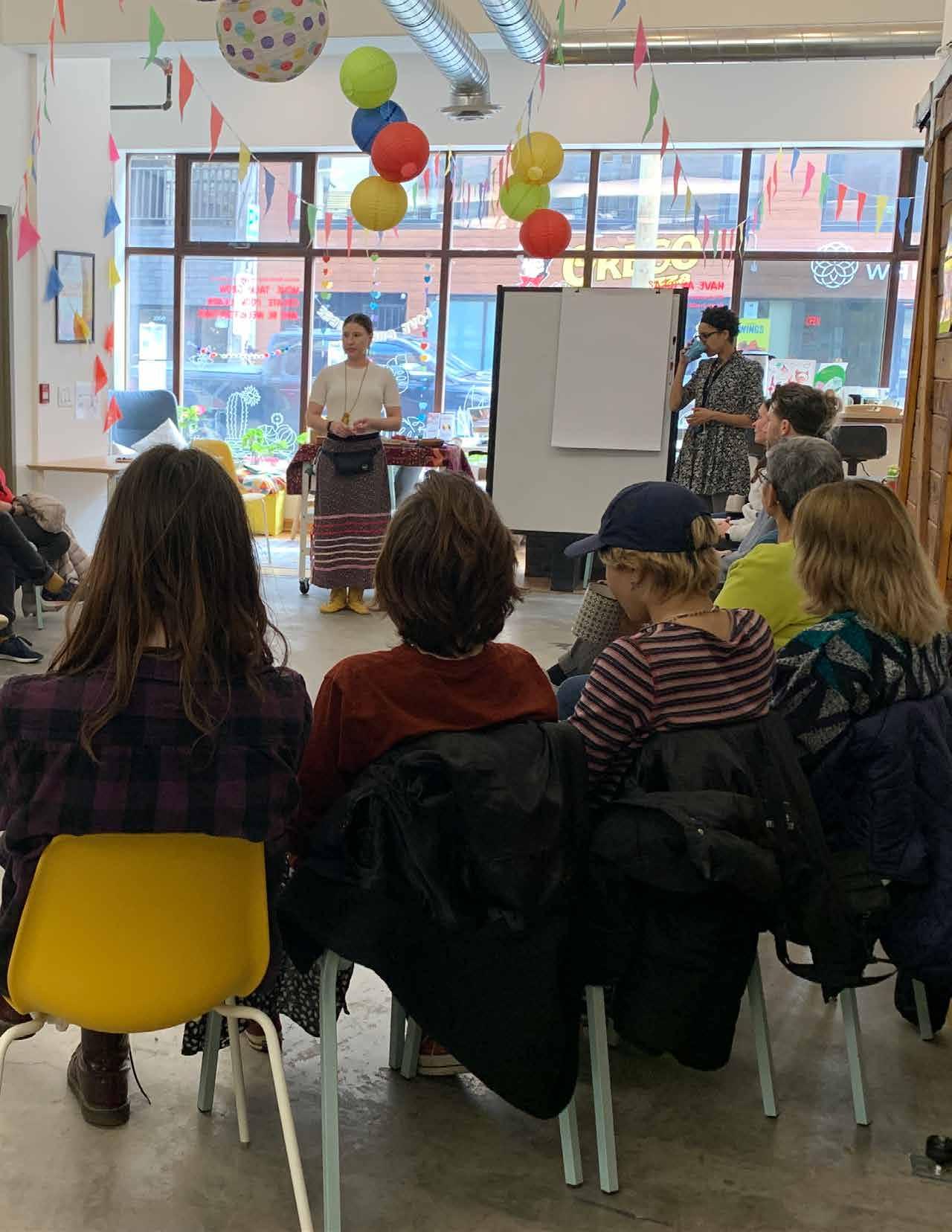
Grounding our efforts in learning and building shared understanding across the team
Understanding Every One Every Day as a Truth and Reconciliation Initiative starts with building coherence around what that is and how, as a team, we can act together and confidently communicate this with others. To do this, we began by exploring how we define Reconciliation in the context of Every One Every Day Kjipuktuk.
Ongoing team learning is essential in building a shared understanding of First Nations, Métis, and Inuit culture and history, and how we play a role in supporting a more reconciled future. Currently our team is participating in assigned weekly readings from the book ‘True Reconciliation’ by Jody Wilson-Raybould. This includes sharing reflections and gathering insights to carry forward into our work and personal lives.
As our Truth and Reconciliation learning journey continues, we are consistently asking ourselves how we might embed this learning into our ‘Every Day’ actions and share our learning with the North End community and beyond.
How does Every One Every Day Kjipuktuk define and interpret Active Reconciliation?
• Raising awareness about colonization in “Canada” and exposing the ongoing injustices and harms towards First Nations, Inuit, and Métis Peoples.
• Disrupting oppressive and inequitable spaces and processes that are woven deep within our civic and social infrastructure through meaningful actions and active allyship.
• Reclaiming individual and collective identity, not just of First Nations, Inuit, and Métis People, but of everyone.
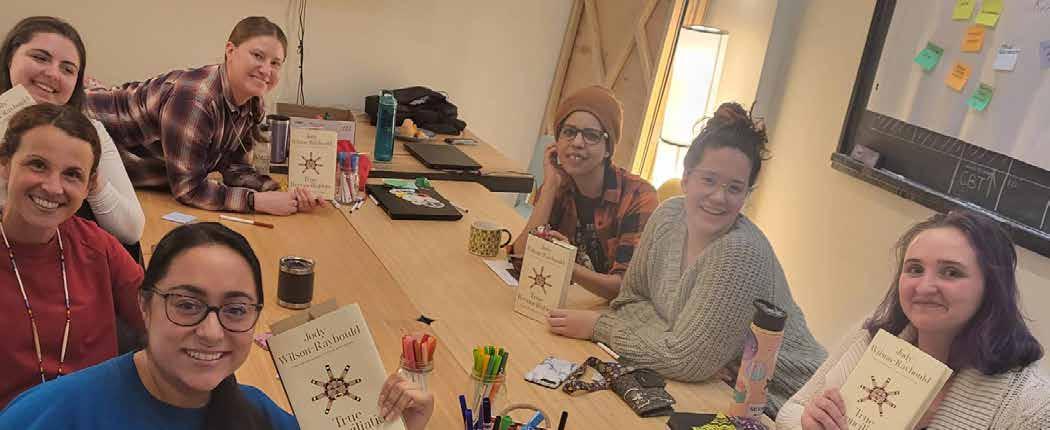
• Restoring harmony with kin, the land, the 4 waters, and all of nature.
• Reviving and reclaiming treaty relationships.
• Acknowledging and valuing Indigenous knowledge systems and paradigms.
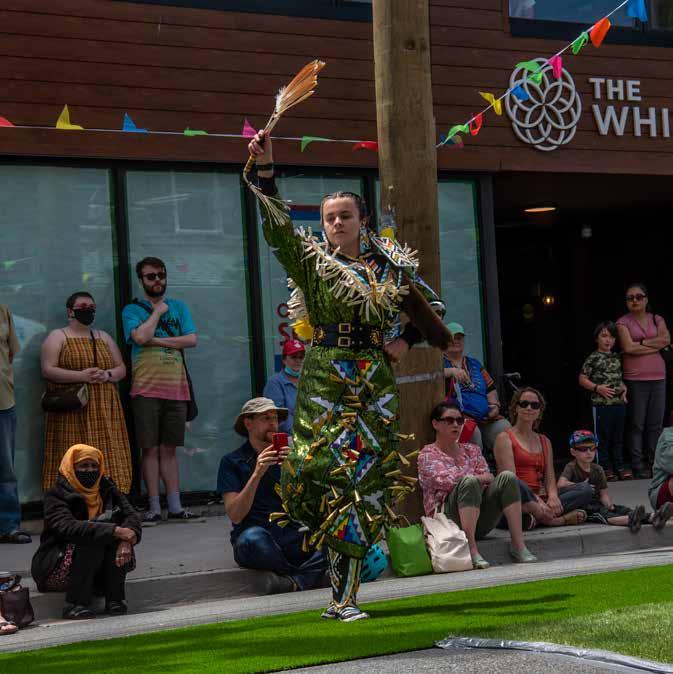
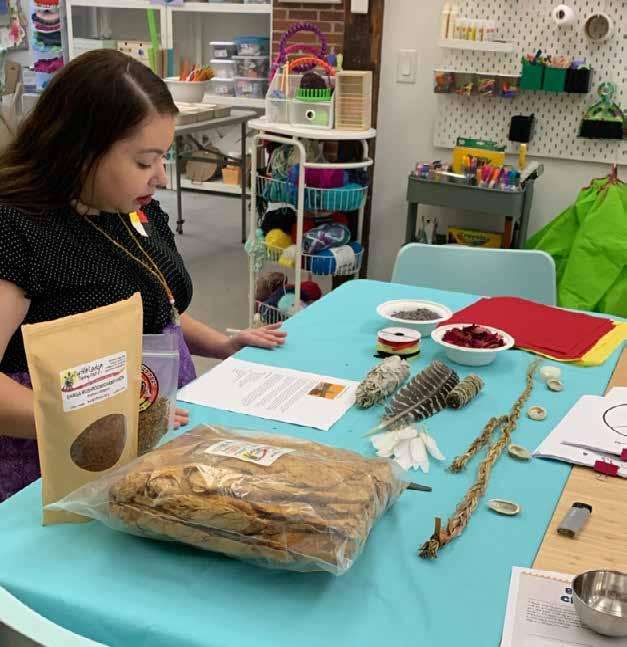
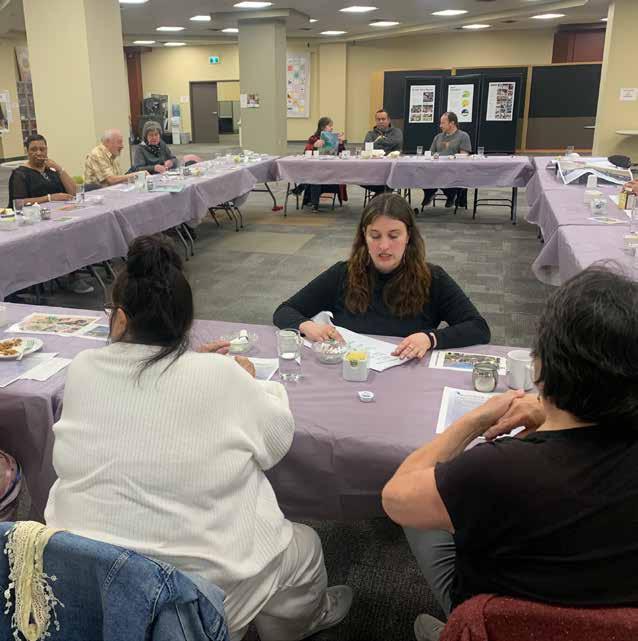
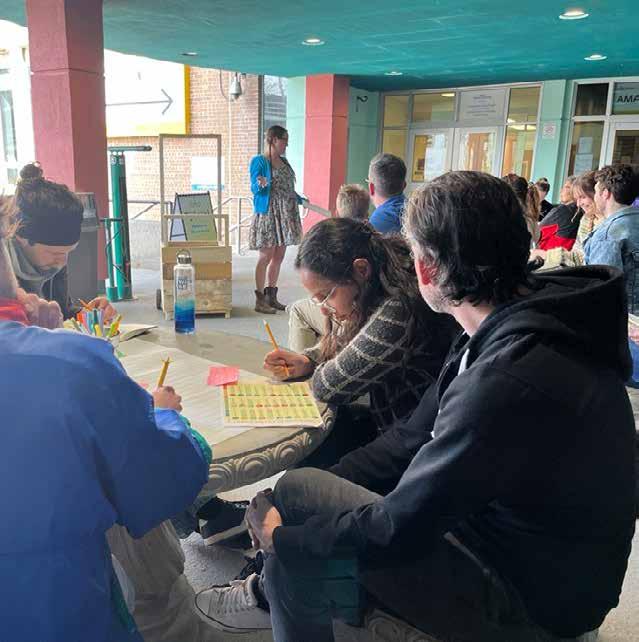




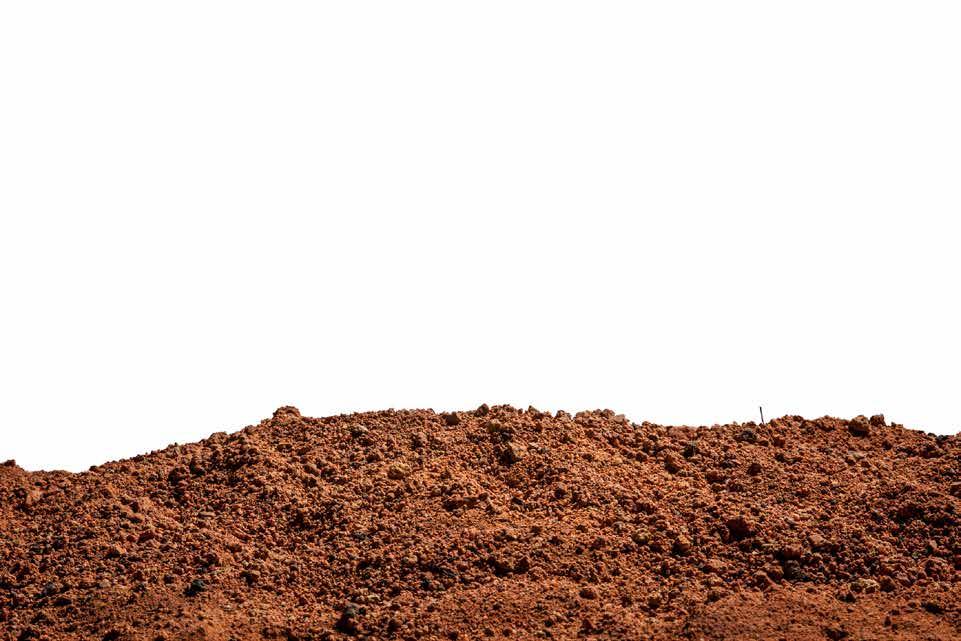






















A planning resource for discovering and adopting decolonized learning and practice while maintaining accountability.
By design, the framework applies a reconciliation lens across the Support Platform. The purpose is to implement and evaluate decolonized practices in our work and widen our scope of understanding of Truth and Reconciliation in action at the neighbourhood level. The framework includes an open access document and a large visual that inspires dialogue and shares the work of Every One Every Day as a Reconciliation initiative more broadly, while holding us accountable to our commitment to Truth and Reconciliation and the impact or our actions.
Another important function of the framework is to deepen our connection with the Mi’kmaw Native Friendship Centre and its programs. Having a large visual to demonstrate our current course of action towards Truth and Reconciliation will help to inform staff and initiate conversations around potential program collaborations and align our efforts with the purpose and pathways of the overall vision of the future Wije’winen Centre.
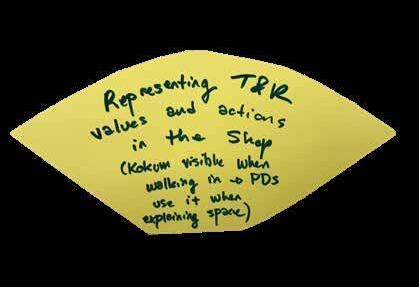
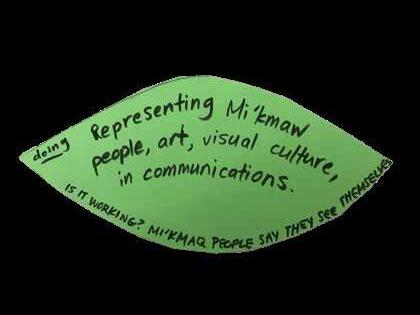
The purpose of creating ‘Kokum’, a Reconciliation framework, is to explore decolonized practices and to widen our scope of understanding of Truth and Reconciliation in action at the neighbourhood level. The branches of Kokum are the over-arching roles the Platform team is responsible for, where strategies towards reconciliatory action have been broken down into categories. The leaves of Kokom represent the agreed upon actions and interventions we take to advance Truth and Reconciliation in our work, and in our relationships and interactions with people, land, waters, and nature. These actions are identified by our team through cycles of individual and group reflection, collaborative analysis, and shared learning, with support from Mi'kmaw Native Friendship Centre staff, Indigenous community leaders and knowledge holders, and residents from the North End community. They serve to solidify our learning into action and make us accountable to doing what we say we are going
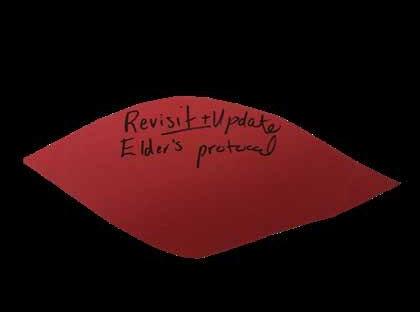
“The road we travel is equal in importance to the destination we seek. There are no shortcuts. When it comes to Truth and Reconciliation we are forced to go the distance”Above: Leaves showing actions the team is taking, would
Identifying ways to communicate & demonstrate Every One Every Day as a Truth and Reconciliation initiative
Truth & Reconciliation Project: ‘Every Day’ Action Project
Every One Every Day invites residents into new opportunities for collaborative learning and relationship building among Indigenous and non-Indigenous community members. This project aims to build greater understanding and awareness of First Nations, Métis, and Inuit presence, and lived experience in the urban context, and provides spaces for Indigenous residents to share their skills, talents, and culture with neighbours.
This project emerged from a growing interest from residents to learn more about First Nations, Métis, and Inuit culture. During our seasonal programs, sessions with Indigenous content or Indigenous themed activities are among the most attended. Some examples of these sessions include ‘Land Acknowledgments’ where 32 participants learned how to develop a personal land acknowledgment; The initiation of a Truth and Reconciliation Lending Library; And, ‘Tea & Luski’, an open invitation from Indigenous hosts inviting residents to come for tea and traditional bread, to listen to stories, and feel safe to ask questions they may otherwise feel uncomfortable to ask.
“The foundation of any relationship is story sharing.”
–ElderResidents who have participated in Indigenous-led sessions have experienced moments of transformation that have shifted their thinking and created new opportunities for continued life-long learning and active participation in reconciliatory action.
“I went to ‘Powwow Etiquette’ because I’ve never been to an actual powwow. I told myself it was because I didn’t want to act like a tourist or invade space. I didn’t really believe the dancers wanted “outsiders” there, why would they, why would anyone? (This kind of thinking is as old as the ass in assume and about as helpful.) By way of contrast, the session host, Jesse, bowled us over with her enthusiasm and encouragement, while gently making a few key points. The respectful term for what the dancers wear is regalia. It’s not a costume, a powwow is not theatre, and nobody is playing dress-up. She spoke from her own experience so we would really get why you do not try to examine or touch the regalia without permission. It was useful to learn that a group of chairs might be reserved for Elders (so check), that Elders eat first, and that the powwow announcer will guide you through the gathering, including when everyone is welcome to dance. Because of this session, and the joy Jesse emanated when she talked about dancing fancy shawl, I will, gratefully, go to a powwow this summer.”
–Julie, North End residentPowwows are a great source for building cultural awareness and understanding. This is the story of one resident's experience participating in an Indigenous-led session at the Neighbourhood Shop. The knowledge she gained, and her overall experience broke down barriers of misunderstanding and opened the door to a new way to experience Indigenous culture, the Powwow. Imagine every resident had a similar experience through active participation in one of our projects. This is the transformational learning experience Every One Every
Albert Marshall
Day offers to residents to support the weaving of Truth and Reconciliation into neighbourhoods and across communities.
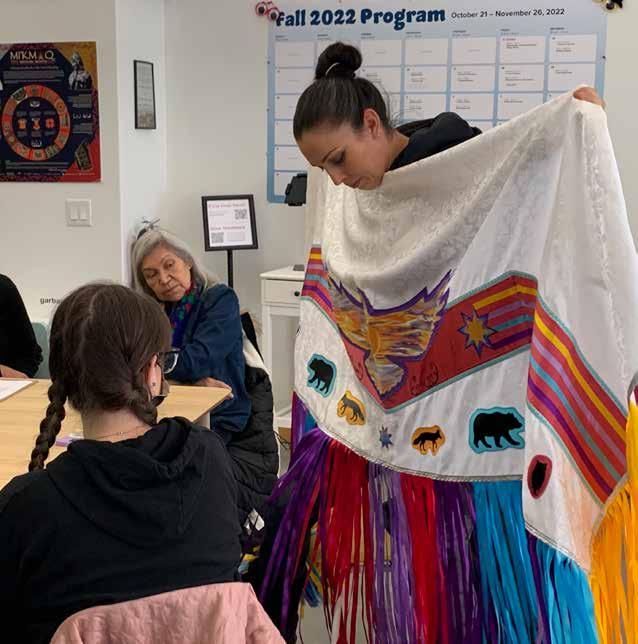
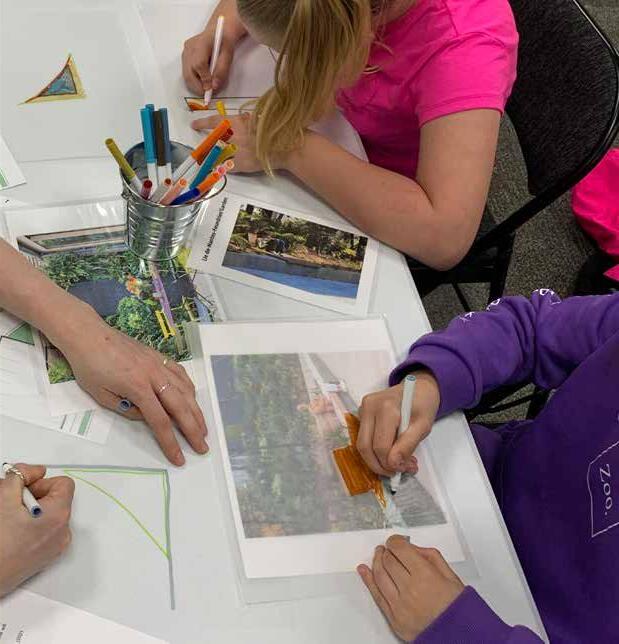
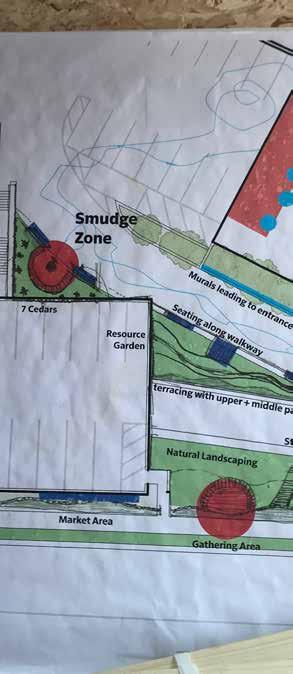
Photos, top to bottom: residents make Three Sisters Soup at the Mi'kmaw Native Friendship Centre, learning how to make dreamcatchers during a session, collaboratively designed plans for a garden and gathering space outside the Mi'kmaw Native Friendship Centre, host Jesse teaches about her regalia at her "Powwow Etiquette" session.

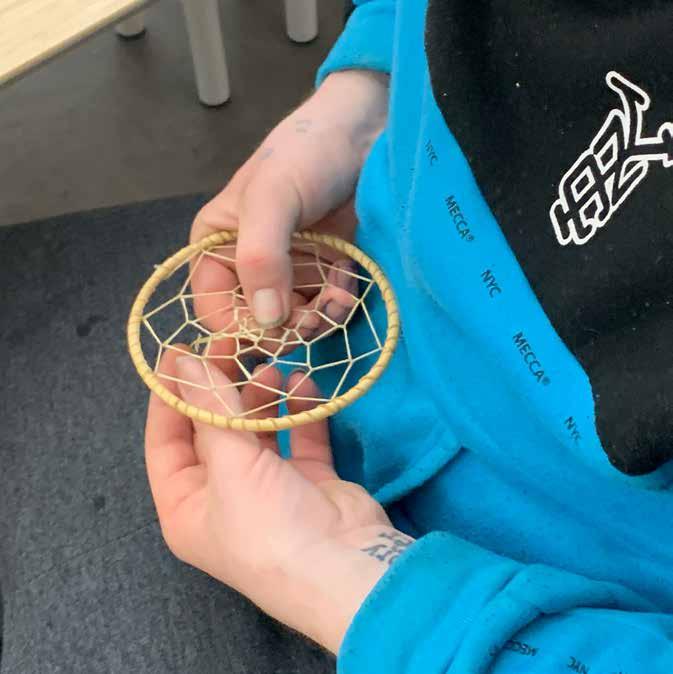
Every One Every Day Kjipuktuk is working to develop a systems approach to growing large networks of people, participating in everyday practical activities. Over time this contributes to what we refer to as “Participation Culture”.
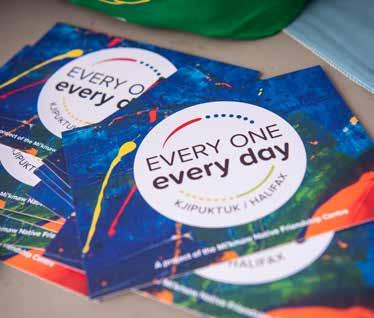
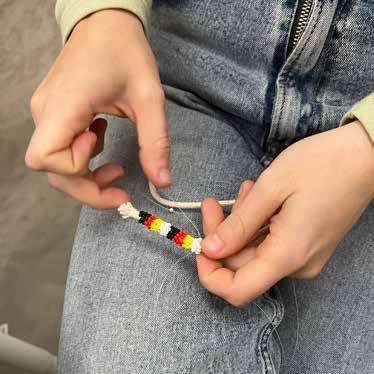
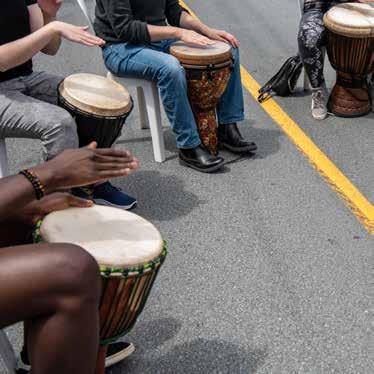

This approach requires building two interconnected systems, each characterized by different elements and design principles. The first is a support platform for growing projects – developed by the team in close connection to emerging partners, with a keen eye to leveraging existing community and neighbourhood assets.


The second is a growing network of participation, developed through residents and the team working together to co-design and adapt a wide range of practical participation projects. These projects should draw on the capabilities and creativity of residents and utilize local resources as much as possible. As more projects are developed, more opportunities become available with varying entry points for residents to take part in. This is how the network of participation grows across neighborhoods, builds partnerships, and supports social cohesion, and is the foundation of the Every One Every Day participatory approach to community building.

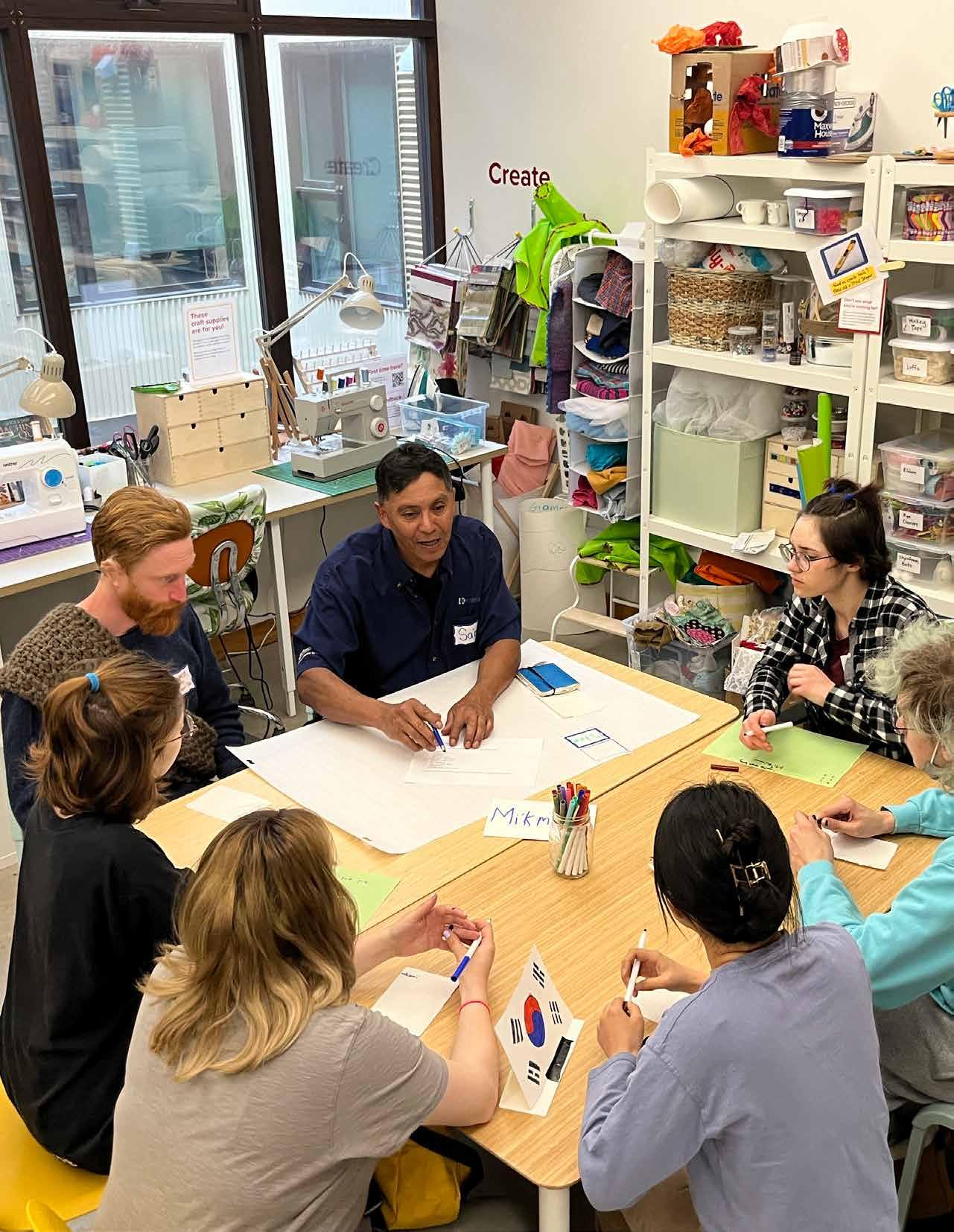
The support platform consists of Inter-connected elements that create the conditions for inclusive participation, woven into everyday life:
A platform team that provides two primary functions; structural support, and neighbourhood project co-design. Support team members lead the design and development of essential support activities pertaining to strategy and direction setting, team learning, research and development, communications and design, and team and platform operations. The neighbourhood project design team members lead the design and
development of a growing network of neighbourhood projects and provide critical support with connecting neighbourhood assets through building relationships based on reciprocity and acting on opportunities.
A growing network of neighbourhood infrastructure that works to increase inclusivity across spaces and projects. Anchored by the Gottingen St. Neighbourhood Shop, this collection of spaces continues to grow and deepen based on continued surfacing of activities that are mutually beneficial.
A range of open invitations, shared through diverse communication channels including regular cycles of newspapers that get distributed doorto-door. The newspapers play a valuable role in helping to communicate the many ways to contribute and take part, while also sharing stories of different people, and the projects that are emerging. In particular, the content and visuals within the newspaper have become a useful channel for sharing knowledge, and the emerging vision, for weaving Truth and Reconciliation into our work.
An evolving system of operations to enable the team to streamline complex collaborative processes and maintain high levels of organization and communication across team members and with residents.


A growing collection of equipment & supplies that develops based on resident needs and interests and can support a growing collection of projects that vary in scale.
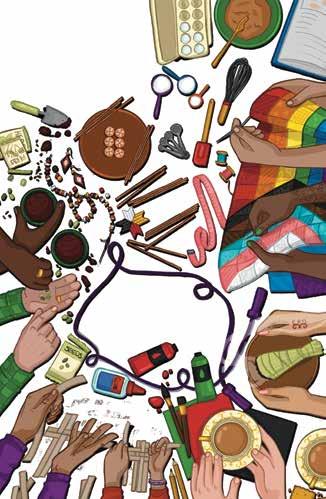
Together, elements of the support platform create the conditions for a growing network of participation that includes people working together to bring their ideas to life, with new projects being designed, tested, modified, replicated, and discarded.
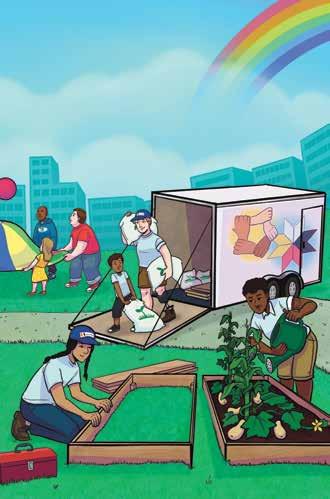
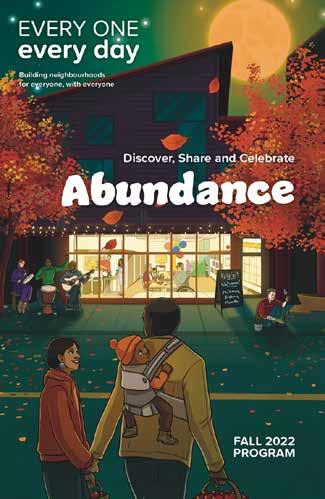
“It [newspaper] gets me excited, even the design, not just the content.”
–Resident
The Shop on Gottingen Street is 2270 square meters (about four times the area of a basketball court), located on a busy main street in Halifax North. This specific location holds significance in several different ways. It is across the street from where the Mi’kmaw Native Friendship Centre ran its core operations for over 30 years and is also just a few blocks away from where the new Wije’winen Centre will be built.
The Neighbourhood Shop opened its doors to residents in June 2022 and serves as an anchor space for residents to learn about the work, interact with the team and other residents, and be inspired and get involved. It has large, street-facing windows which allow people to see the activity inside and invite them to come in.
The creation of the shop posed the first major design challenge for the team and provided in-depth experiential learning around infrastructure that is purpose-built for inclusive participation. Furthermore, the interior of the space is in a continual state of re-design—where equipment and supplies get added or changed based on the evolving interests of residents passing through and using the space. Since launching the Shop, the team has made several key observations that are helping to inform needed adaptations as we learn more about how residents interpret and interact with the space and the role that this plays building participation culture across the neighbourhood.
The shop itself has proven to be a powerful tool for communicating elements of our intent and vision, and attracting new people to come into the Shop takes on-going experimentation. Furthermore, the fact that we are new and unfamiliar requires an

element of trust-building, particularly for residents who have lived in the North End for a long time and may or may not be hesitant in the face of new developments.
Children and families are welcome and encouraged to use the shop in all its forms, and a central aim of this work is to invite children to become “mini-makers” in their own neighbourhoods. In some cases, this can also turn into a relaxed space for caregivers to let their guard down and rely on team members for ensuring safe practices and stimulating interaction with the space.
Set-up of the Shop is designed to invite residents in and as quickly as possible and foster a sense of care and ownership that can easily lend itself to initiating and taking part in a range of co-creation activities. The careful balance, as discovered by the neighbourhood team, is to avoid the feeling of it becoming a neighbourhood “drop-in” space— where residents feel at ease to relax and gather, but where participation and co-creation can easily fall to the wayside.
At times, some residents have needed support outside of the inscribed roles and responsibilities of our team. While it is important to support residents as they walk through the door, it is most important to ensure the safety of all in the space, including our team members. Because our team gathers each week to discuss issues as they arise, we have had opportunities to discern what the boundaries are between being considerate of people’s situations, and when this becomes unsafe or works to exclude others.
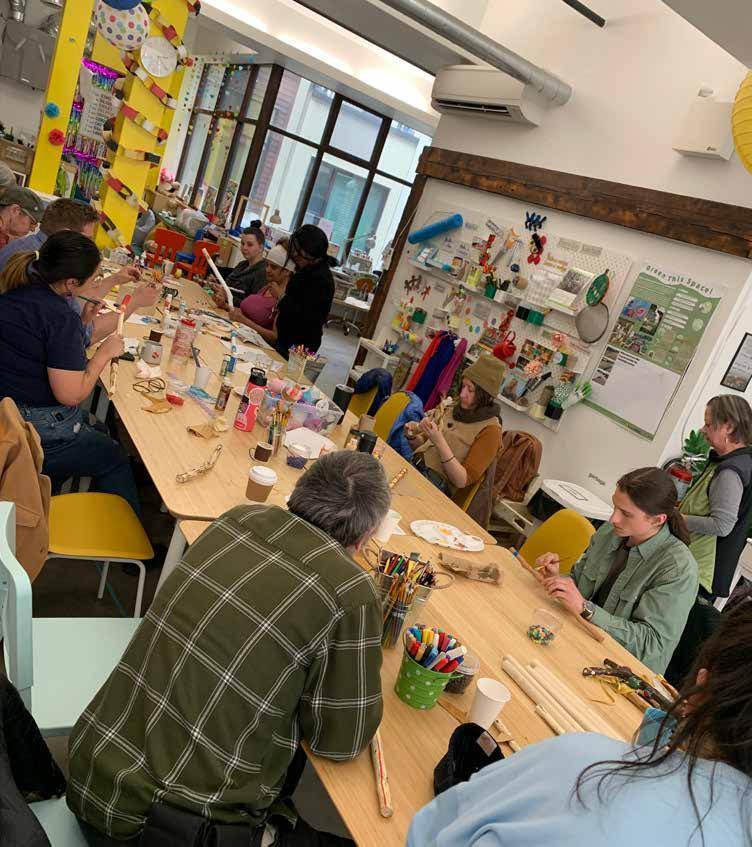

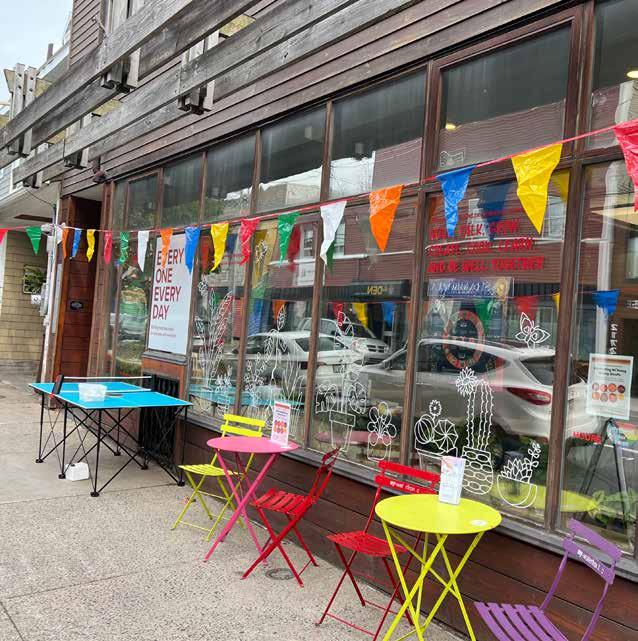

Since opening its doors, the Shop has become an inviting space for creativity and connection among neighbours. While some activities are designed by the team, others emerge from what residents discover when they're in the space, and new connections that develop.
• ‘Kindness Cards’ emerged to stimulate a simple form of making useful and meaningful items from reusable materials. It’s become popular as a low-commitment activity that creates opportunities for residents to focus more on building friendships and connections through conversation, while doing things with their hands.
• As returning residents become more familiar with the space, they can introduce others to the equipment and opportunities, while confidently explaining the vision of Every One Every Day in their own way.
• A student at Nova Scotia College of Art and Design worked with the team to develop his design for a “Seedbarrow” — a mobile unit
specially designed for making seed balls! Not too long after, another resident used the Seedbarrow as part of a project called Curbside Blooms (in partnership with North End Business Association), where residents were invited to take part in planting the sidewalk planters along Gottingen Street.
• Often times, a sense of connection and ownership is expressed by residents taking on certain activities, such as making a hot drink for themselves and others, creating labels for things, or helping to re-organize a specific area within the Shop. On a sunny afternoon in the Shop, one resident offered to clean the very dirty (and very large) street facing windows!
Photos, top to bottom: Kindness cards in the Shop, The Seedbarrow loaded with plants for Curbside Blooms, residents making soda together, a resident cleans the Shop windows, the children's area set up for Drag Storytime. Sewing

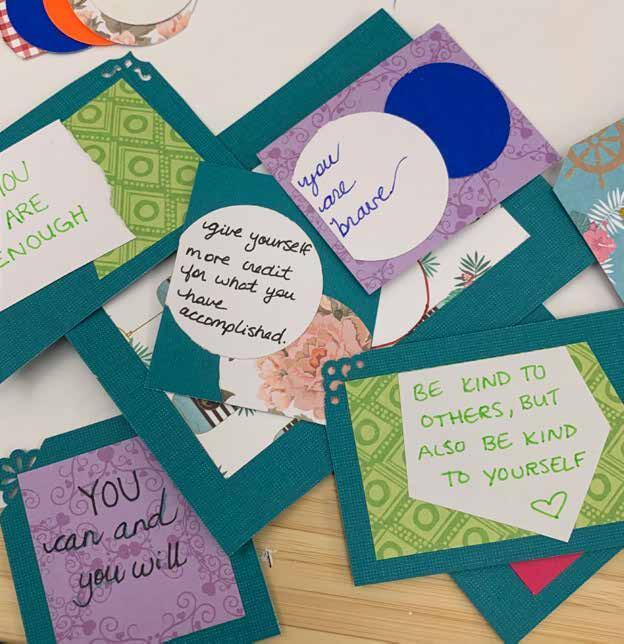
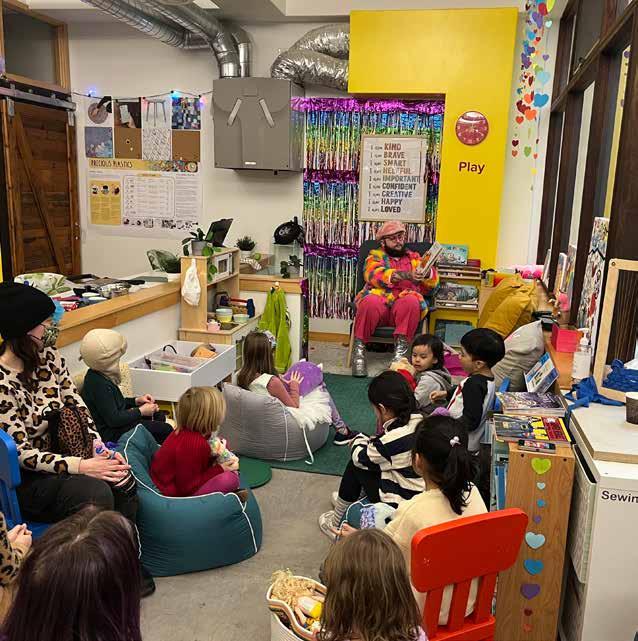
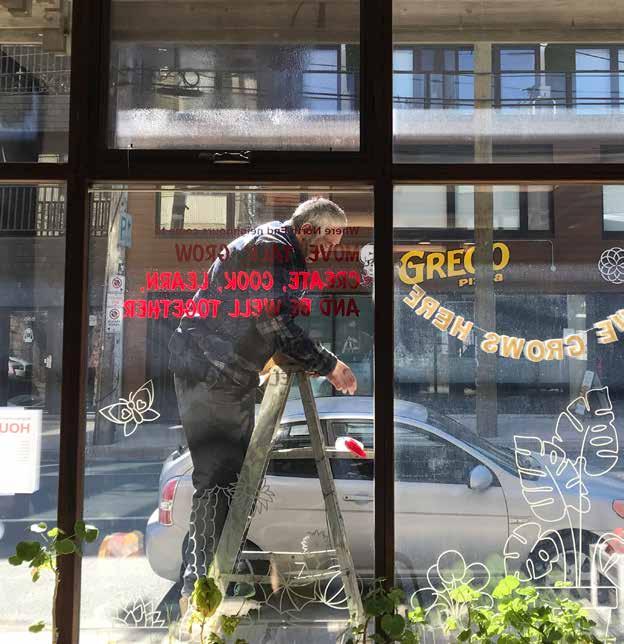

The Community Build Trailer supports a range of projects and inspires fresh ideas around how residents can work together to shape different spaces in their own neighbourhoods. This mobile expansion of the support platform emerged through a partnership with OSO planning + design and demonstrates new pathways for bridging civic and social assets across the neighbourhood. The trailer also enables the platform team to work with residents on a wider range of projects that emphasize working together to shape the built environment around us.
Engaging with Halifax Tool Library to support skills development and sharing; And design and build sessions with the Mi’kmaw Native Friendship Centre to re-imagine their front entrance, which borders a public thoroughfare. As projects emerge, the trailer continues to spark new ideas and interest around how people and organizations can work together to bring creativity and connection into the public realm.
The Trailer can travel just about anywhere and is equipped with all the tools necessary to build or fix basic things like shelves or tables, or create new structures in the neighbourhood, like gardens and gathering spaces. It was also envisioned that the Community Build Trailer could be put to use by partner organizations, who may find value in the trailer for space retrofits, small scale build projects, or other community initiatives.
Since its’ inception, the Community Build Trailer has sparked new potential for working with organizations across the neighbourhood in mutually beneficial ways. Examples include working with the North End Business Association on placemaking initiatives such as seating and gardens;
The Community Build Trailer creates pathways for different demographics across the North End to engage with emerging projects or start new ones. It is also a specialized form of infrastructure that supports skills development and sharing around a range of hand and power tools. For residents interested in building, greening, repairing, designing, or other specialized activities, projects such as Let’s Build and Shape this Space have created new and varied entry points for more people to be inspired and get involved.
The Community Build Trailer is undergoing a beautiful transformation! With support from local artists from the Urban Indigenous and African Nova Scotian communities, team members and residents are working together to co-design a mural for the outside of the Build Trailer. Hosted at Wonder’neath Art Studio, residents will be invited to paint the mural during Halifax Mural Festival 2023!
"Our feeling is that people need to be involved in a participatory way, and be continuously involved in order to build that sense of ownership... It's so exciting...the joy of seeing people see that they can change the way our city feels."

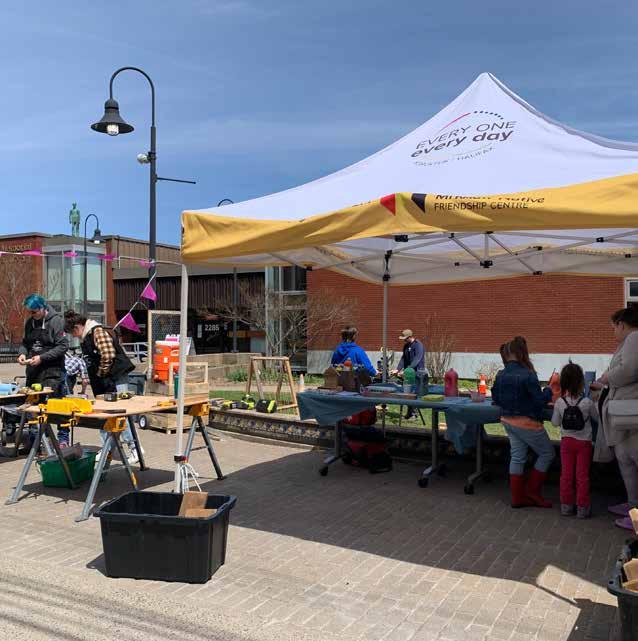
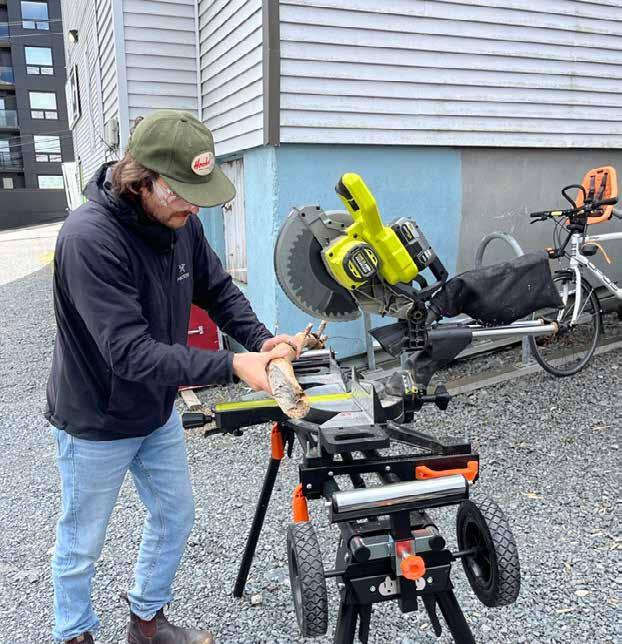

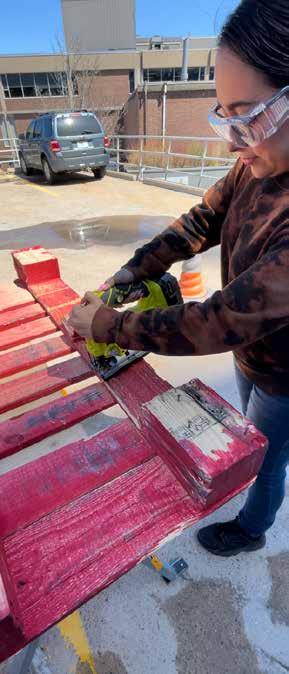

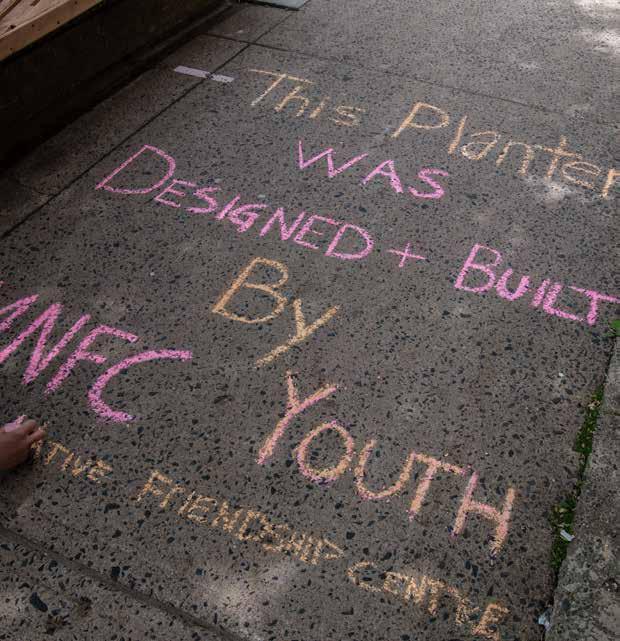
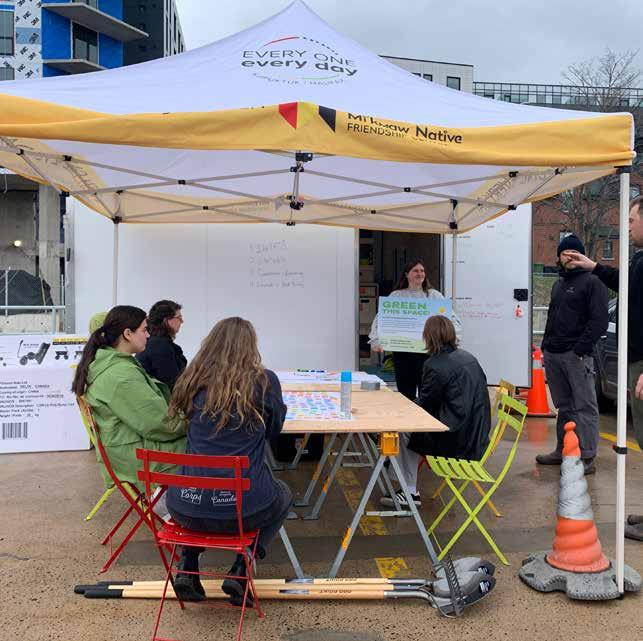
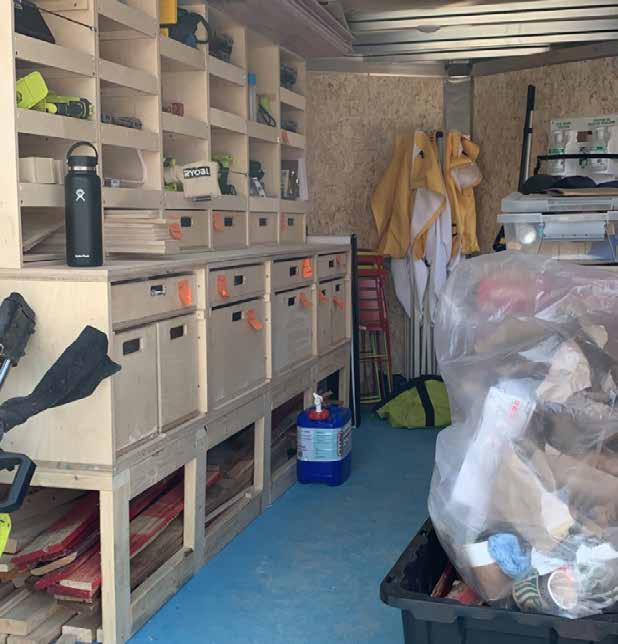
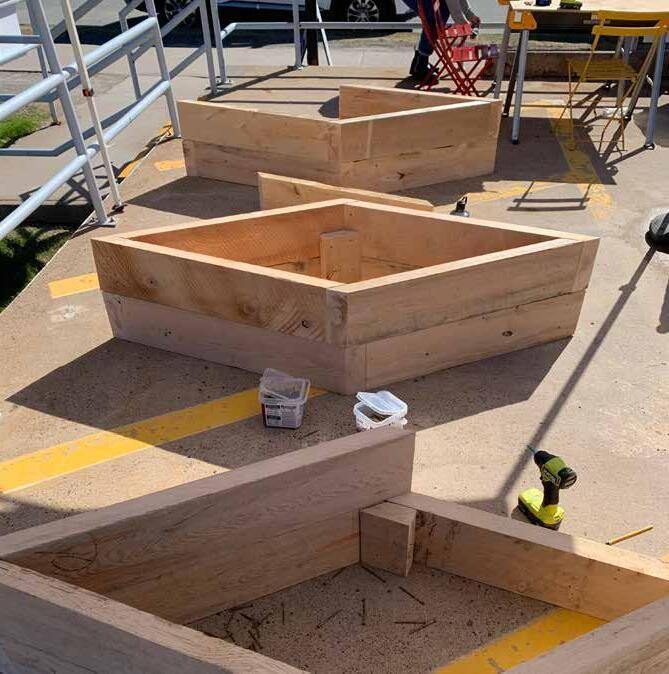
This seating area and planter was installed just outside of the Shop was designed by OSO planning + design, in collboration with youth from the Mi’kmaw Native Friendship Centre. In this way, their ideas and creativity will live on in the neighbourhood.

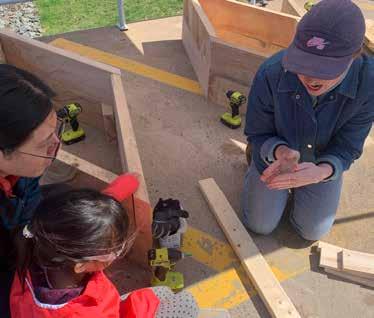
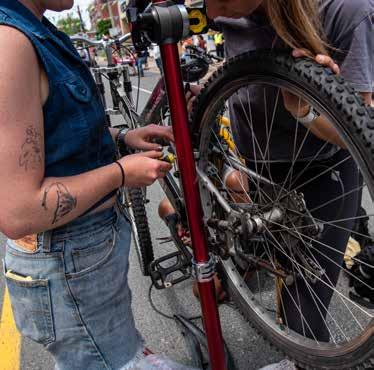
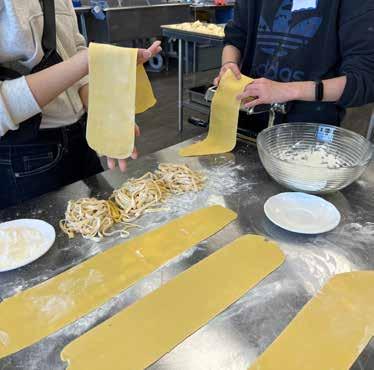




As the support platform develops and grows, its’ success hinges on finding opportunities to bridge civic and social assets across the neighbourhood, and growing the network of projects that invite new and varied ways to take part. To do this, the team works to nurture new relationships and opportunities that connect local organizations to the support platform in meaningful ways. These relationships are always evolving, and take different forms such as sharing infrastructure, introducing residents across spaces, or co-designing new sessions or projects. By connecting community assets through collaborative projects of mutual benefit, we are creating the conditions to support shared lives and connected futures across the neighbourhood.
Photos, top to bottom: Building cold frames at Veith House Urban Farm, bicycle repair with Bike Again, art at Wonder'neath, making pasta at the Mi'kmaw Native Friendship Centre, screenprinting at RadStorm, building planters with OSO planning + design, a neighbour planting on Gottingen St. supported by the North End Business Association.

By nurturing connections between organizations, Every One Every Day is working to create a growing number of entry points for residents to engage in everyday activities, while discovering spaces they may not otherwise visit. In the short period of time that the Neighbourhood Shop has opened, connections have been initiated with diverse organizations that reflect a wide range of unique and complimentary neighbourhood assets.
The vision for Every One Every Day embeds thinking and practice around how we might work together to build our civic and social systems in ways that enable residents to be co-creators and co-collaborators in the places in which they live. It is also about re-imagining how cities and neighbourhoods might embed Truth and Reconciliation into everyday living.
While we continue to act daily, we understand that this is generational work which calls for deepening our relationships across sectors, and siloed ways of working. It is systems transformation work that requires individuals and organizations to understand and activate their role in this change.
The intention behind our first partner gathering was to convene diverse partners, working across different scales and focus areas of the system,
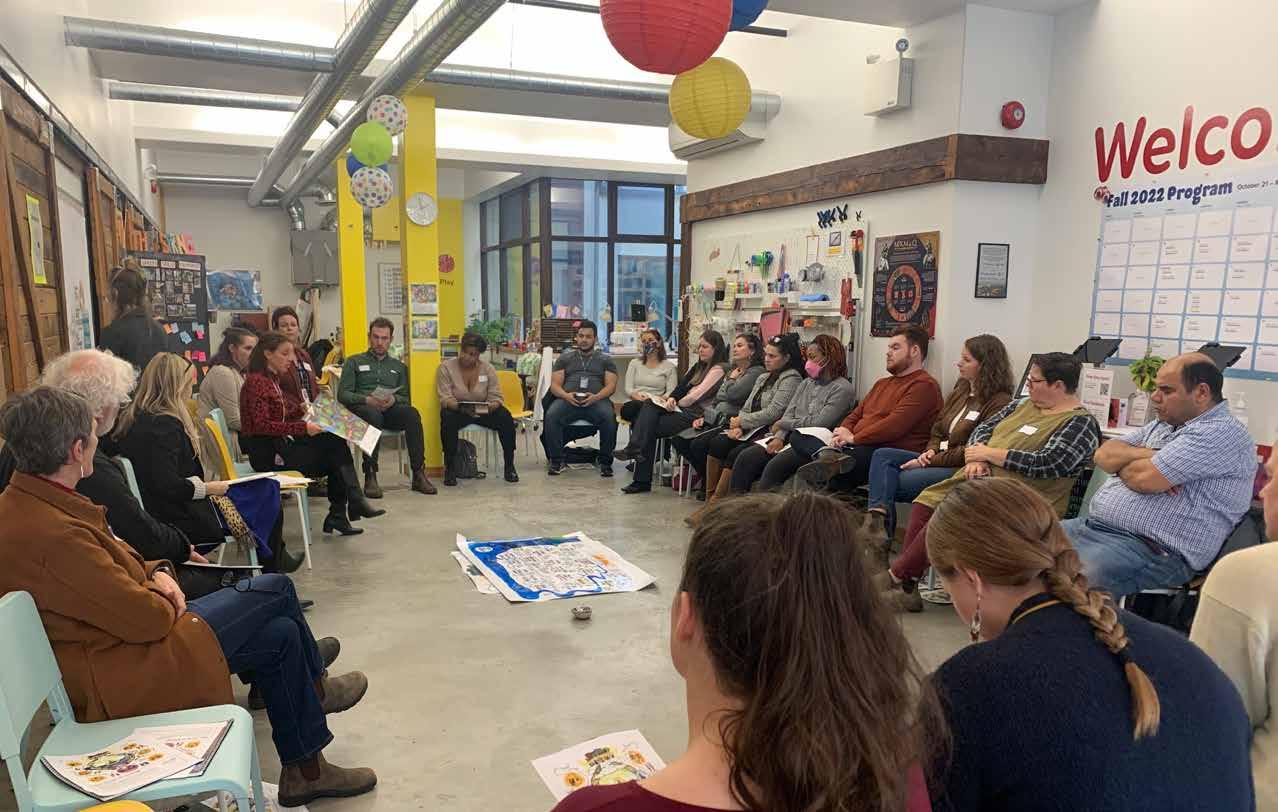
to share lenses and perspectives in the work and create new openings working together in new ways. This included Provincial and Federal funders, municipal staff, organizational leaders, and community practitioners.
To situate our work in decolonized practice, we opened the gathering with experiential learning to explore Mi’kmaw history and culture and taking time to reflect and share our stories. This time for connection and learning set the tone for our afternoon, which focused on deepening collective understanding of the approach, and discussion of early insights. Dialogue was framed around key questions emerging from the work, which must continue to be explored over time, and alongside partners and potential collaborators.
A common thread emerged around the importance of capturing emerging stories, and the many ways that different community members come to see and experience the Every One Every Day platform. While it is often a struggle to communicate the complexities of the work, such as what the platform is and how it works, there is a need to find and articulate the types of stories that can help to communicate how Every One Every Day is creating the conditions for a new kind of neighbourhood – one that shows the visible signs of contribution from many different residents, and how Truth and Reconciliation can be woven into the social fabric of a place.
To create true systems transformation, the Every One Every Day platform must be recognized as a pathway for mutual collaboration and cooperation between private, public, and social sector actors. There is a continued need to articulate how cities across Canada are working to create innovative partnerships, focused on the development of “next generation social infrastructure”. As a starting
place, conversations emerged around the need to develop opportunities for external stakeholders, such as municipal officials and private developers, to actively learn and experience benefits of engaging in city planning and development in resident centered ways.
Across the social sector there is need for new approaches to funding that apply a systemic view to financing and work to nurture collaboration among civil society actors, rather than hinder it. Conversations emerged around the challenges of short-term funding and limited organizational capacity, as limiting factors in how organizations can work together to align and amplify efforts. As a neighbourhood based approach that is working to establish new forms of mutual support and collaboration across spaces and projects, continued growth of the support platform will call for new relationships with donors, who seek to fund systemic interventions across multiple, overlapping outcomes. Excitement and energy emerged from the possibility of convening current and potential funding partners to explore new models of collective grant-making.
What would it take to fund a network of participation? How would that be done collaboratively between organizations in a place and by funders?
What new models of co-production and co-learning can you imagine for Halifax and how might you/ your organization play a role in this?
How can we move from transactional funding models to relational systems design?
During the Spring of 2023, Every One Every Day Kjipuktuk welcomed a student researcher to join the team to conduct a 9-week research project which focused on participants from 13 community-based organizations across the North End and identified the potential for collaborative partnerships. The research also considered how participants understood the benefits of a participatory approach in community building, and what assets their organizations could contribute to the Every One Every Day platform.
The research demonstrated the similarities in what participants envisioned for the North End community; specifically, expanding shared spaces and other shared assets, increasing representation of the Urban Indigenous and African Nova Scotia communities in the built environment, and cohesiveness among North End organizations based on clear and consistent communication and partnerships rooted in reciprocity and shared values.
• Halifax Tool Library
• Mi’kmaq Child Development Centre
• Ecology Action Centre
• Mainline Needle Exchange
• Warehouse Market
• Veith House
• Mobile Food Market
• Wonder’neath Art Society
• OSO planning + design
• Halifax North Memorial Public Library
• Bus Stop Theatre
• Delmore Buddy Daye Learning Institute
• North End Business Association
utilize, co-designing projects that focus on building representation of historical communities in the North End, and development of a shared-resource directory for participating organizations.
Drawing on this research, next steps include identifying 3 to 5 participant organizations and coordinating time together to co-design and develop actions towards this vision for the North End. Some initial considerations are access to the Neighbourhood Shop for other organizations to
"Recognizing that even as we long for more participants we want to build carefully and mindfully, preferably one family at a time, because it allows us to really know folks well”
“To create those pathways and opportunities and invitations for folks who care...to have something to put their energy towards to feel part of something greater, to have that sense that we aren’t alone”
–Ecology Action Centre

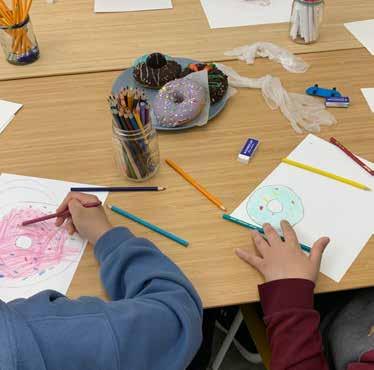
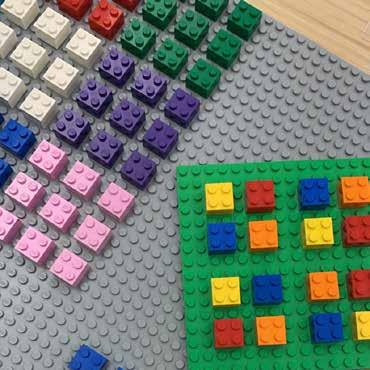
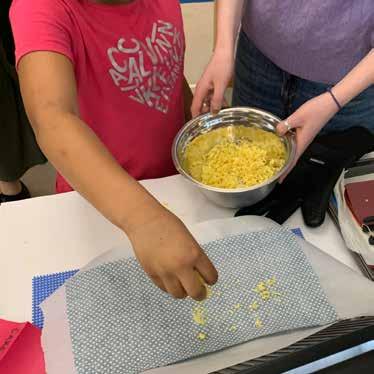
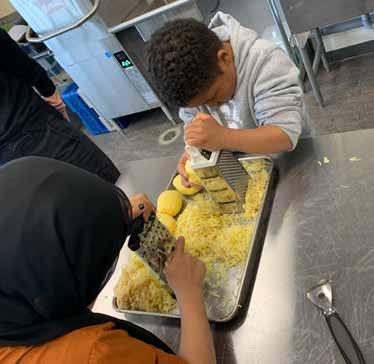
The Every One Every Day platform is all about expanding the range of entry points for individuals and organizations to contribute and take-part in on-going ways. In practical terms, this might mean creating opportunities for people to contribute their ideas, share a talent with others, loan a piece of equipment, or promote activities on social media.
To achieve this, we have come to understand the critical process of co-design and its’ influence on how a range of invitations can be crafted, but also the importance of communicating different entry points through our newspapers and interactions.

Photos, top to bottom: Upcycling jewelery, playing games from around the world, cooking tortei di patate together, making reusable beeswax food wraps, drawing a food still life, We Can! collaborative business program learning how to make jam from a local business owner, neighbours making and learning about talking sticks from Elder Deb Eisan.
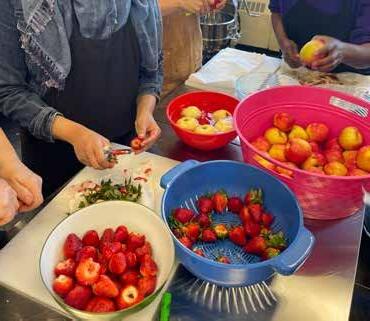
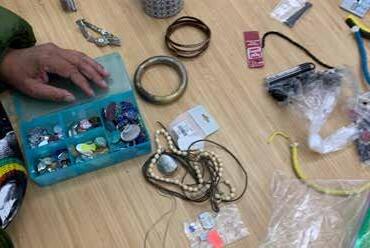
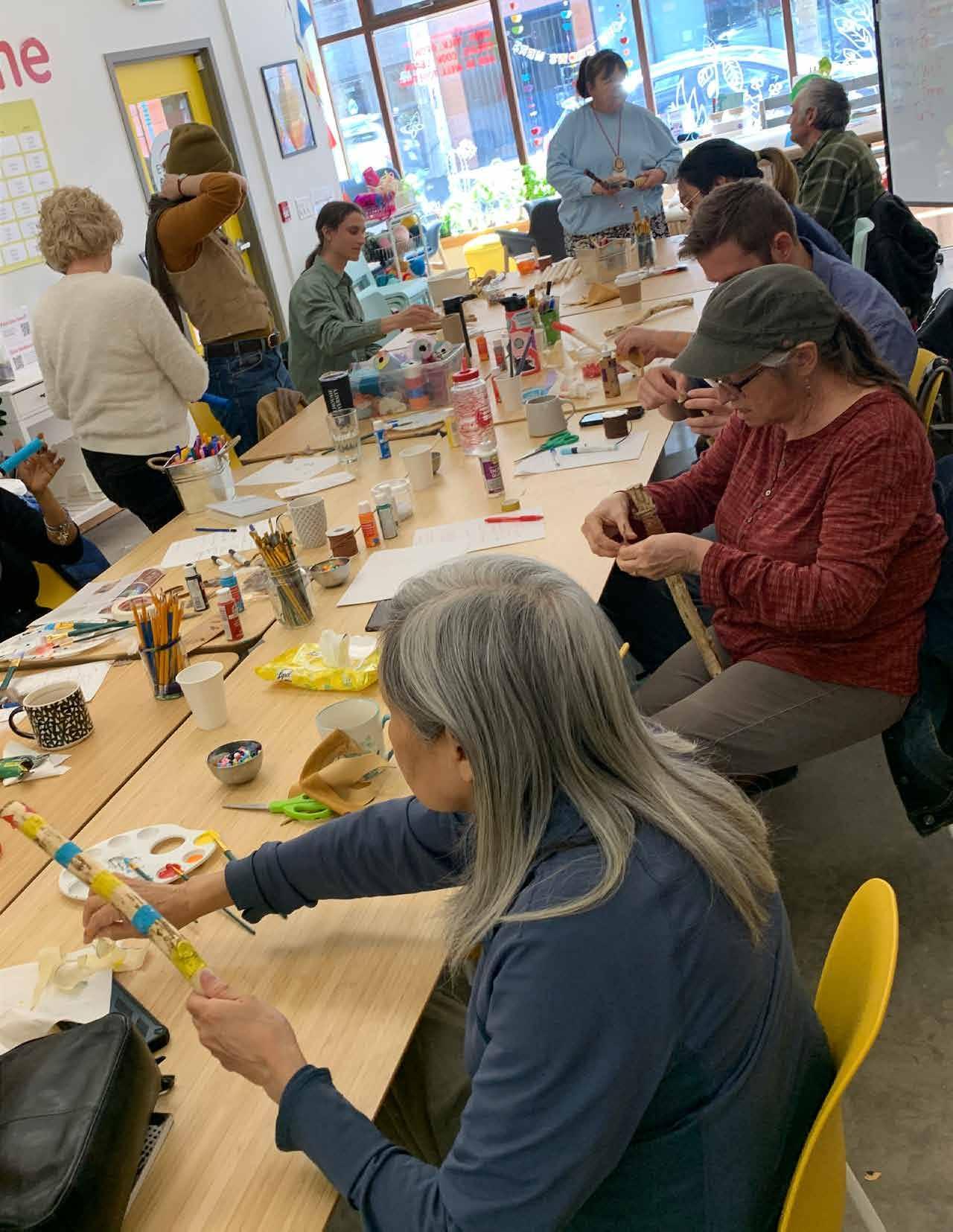
Work with the team to plan a session for an existing project like Trade School
Share your knowledge and skills with others
Help build something at the Community Build Trailer
Help others to get started on their own DIY project
Explore ideas for new projects, starting from scratch Get inspiration from around the world www.communityloversguide.org
Take part in a collaborative business program
We Can! Turn your recipe into a jarred food product

Work with others to organize and host existing projects
Spring Partners: The Local Source, Real Fake Meats, embetter, Verschuren Centre and Tools For Doing Good.
Provide mentorship and skills building
Spring Partner: Halifax Tool Library
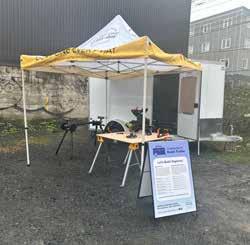
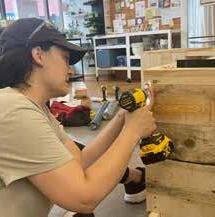
Co-creating new models of co-production
The Community Build Trailer brings inspiration, tools, and support to build useful and creative things for the neighbourhood
Spring Partner: OSO planning + design
G /everyoneeverydayhalifax
e @halifaxisevevryone
Stop by the Shop
Make Something
Free access to a range of equipment & materials
Attending sessions, programs, and festivals
Join in on a Great Cook Session (learn skills, share recipes, and cook together)
Bea
Popsockets hosted Vanessa
Meet Your Neighbours
Connect with new people who live nearby
Design a Neighbourhood Project

Have a cup of tea and find out more
Learn skills & practice with tools at the Community Build Trailer
Distribute Newspapers
Become a distribution site for our seasonal newspaper Contact us to request copies
Working together to plan and host activities in different locations!
Spring Partners: Mobile Food Market, Change is Brewing, AlterEgos Café, Zoe’s Ferments, Verschuren Centre, Discovery Centre, Halifax North Memorial Library
Professional Accompanying of a Resident
Help introduce residents to spaces and activities
Share spaces and equipment to support resident projects
Spring Partners: North Branch Library, Wonder’neath, Hope Blooms, Veith House, Mi’kmaw Native Friendship Centre
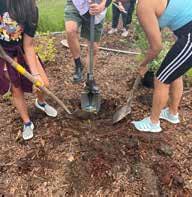
The initiation or adaptation of new projects emerges through a process of co-design between the team and on-going interactions with residents. The emphasis is placed on working shoulder-to-shoulder to brainstorm ideas, discuss elements of inclusivity, and connect people with existing spaces and resources. Throughout this journey of co-creation, the team works together to combine the many ideas that are emerging and help to inform a larger vision of how the project could benefit individuals, and the neighbourhood. As projects come together, they are tested with other residents during one of our seasonal programs. Based on resident uptake and interest, projects can stop or start at any time, be adapted into new variations, get replicated elsewhere, or be dropped completely.
The Let’s Make! Project is all about inspiring residents to get creative while learning and sharing basic skills around making with different materials. Across any neighbourhood, people come with all sorts of skills related to fixing, repairing, making, and mending – which can help us all to adopt more circular ways of living and working.
Over the course of several program cycles, there have been different iterations of projects that focus on making things from scratch – many of which were designed around available tools and equipment such as sewing machines, a plastics station, and a range of tools for building.
Over time, we’ve observed how many residents are drawn to making things but need more opportunities to learn and practice basic skills. Another observation has been experimentation with different equipment and supplies for unexpected uses, such as using the plastics station to make handmade wax wraps.
This natural evolution of making projects has led to Let’s Make! Which invites residents to learn a variety of basic making skills that can help to build confidence around making useful things for ourselves and others.

Shape This Space creates visible demonstrations of how residents can work together to bring nature, culture, and community connection into public spaces across the city. In its first iteration, Every One Every Day Kjipuktuk is working with OSO planning + design and the Mi’kmaw Native Friendship Centre to re-imagine the front entrance of their current office building, which borders a public street and green space. With leadership from Friendship Centre staff and community members, Shape This Space creates opportunities for people to work together to design and build a public space that will bring First Nations, Métis, and Inuit identity into the public realm.
The process integrates respectful sharing and learning around Indigenous knowledge & culture, to design gardens and gathering spaces that integrate Indigenous knowledge and build lasting Indigenous identity in urban spaces.
The co-design process itself, and collaborative nature of the project, makes space for building relationships across cultures and provides opportunities for Indigenous residents to share or learn about their own culture.
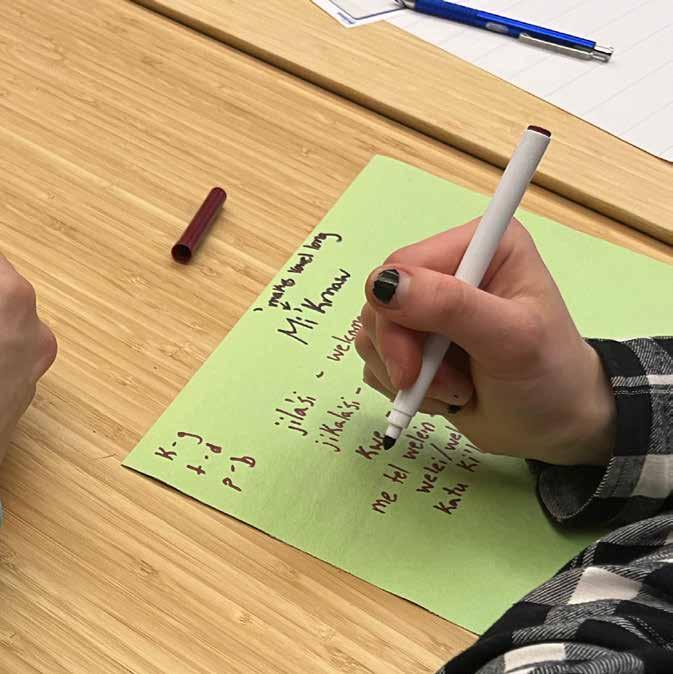
Partnering with the Mi’kmaw Native Friendship Centre also provides an opportunity for the Platform Team to engage with its staff and programs on a deeper level and invite on-going contribution to the vision of the Shape this Space project.

Language Connect emerged through a co-design process with staff and community members connected to Immigrant Services Association of Nova Scotia (ISANS). It invites residents to foster new connections with people living nearby, through teaching and learning the basics of different languages. In doing so, Language Connect creates a fun and practical way to build familiarity and connection across the many cultures that make up the neighbourhood.
The first iteration of Language Club was bursting with participation and excitement. On average, 32 participants gathered to teach and learn across ten different languages.
“Everyone was so engaged and excited to be learning, and those who were teaching were so great at teaching and sharing what they knew, even if their English was limited.”
Simply Sewing brings residents together to learn essential skills for sewing things from scratch or extending the lives of their favourite items. This project initially launched under the name ‘Share and Mend’, inviting residents to bring in gently used clothing that needed mending, and others to apply their mending skills to do basic repairs. While some residents did bring in clothing to mend,
it was determined that the project needed more structure, or different invitations, to connect with each other and engage with the project overall. Additionally, residents participating in the project shared a growing interest in learning how to use the sewing equipment in the Shop.

Simply Sewing is about going back to basics and bringing residents together to learn and share the basics of how to sew and mend. Specific sessions will be based on resident skills and interests, such as how to sew a button, patch an item of clothing, or learning to use a sewing machine. Over time, the aim is to connect people with sewing skills, to those who wish to learn, and grow new connections through useful and creative sewing projects.
Photos, left to right: Buidling planters at the Community Build Trailer, writing Mi'kmaw words during a Language Connect session, sewing overalls during a session, painted 'houses' made on Earth Day.

As part of the Spring 2023 Program, the first Collaborative Business Program was launched, called We Can! This 5-week program invited North End residents to work together to turn their favourite recipes into jarred food products. Collaborative Business Programs are designed to be collaborative, emphasizing and strengthening teamwork and shared responsibilities to lower the personal risk, and build stronger collectives. Collaborative Business offers a different pathway for residents to engage with the platform, creating more entry points for participation and inclusivity across projects.
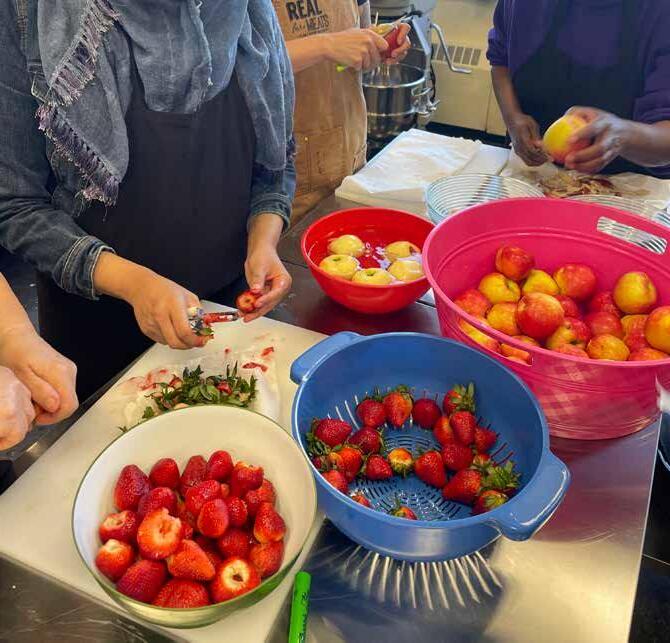
An essential element of Collaborative Business Programs is to bring people together from all walks of life, to meet, share common interests and business ideas, and draw on each other for support to test emerging products or services. The We Can! Program included opportunities for residents to engage in collective skills mapping, organizing a food tasting event together, and making decisions as a team.
As part of the program, local specialists and small business owners were brought in to facilitate a range of topics and connect participants to an existing network of practitioners and entrepreneurs. Sessions focused on diverse topics including safe jarring practices using the waterbath technique, making ingredient lists, exploring sustainable packaging, buying local ingredients, and designing product labels.
For many people, the idea of starting a business can feel overwhelming, if not impossible. The purpose of Collaborative Business frameworks is to design opportunities for people to build confidence and skills as they develop and test their ideas in low-risk environments. Over the course of We Can! 4 participants worked together to batch cook their recipes, create ingredient lists and labels, and test trade their products at the Every One Every Day closing event.
“When everyone started to share their own story and interests, one by one participants began to open and ask each other questions about their experiences and what they hope to get out of the program.”
–Platform Team Member
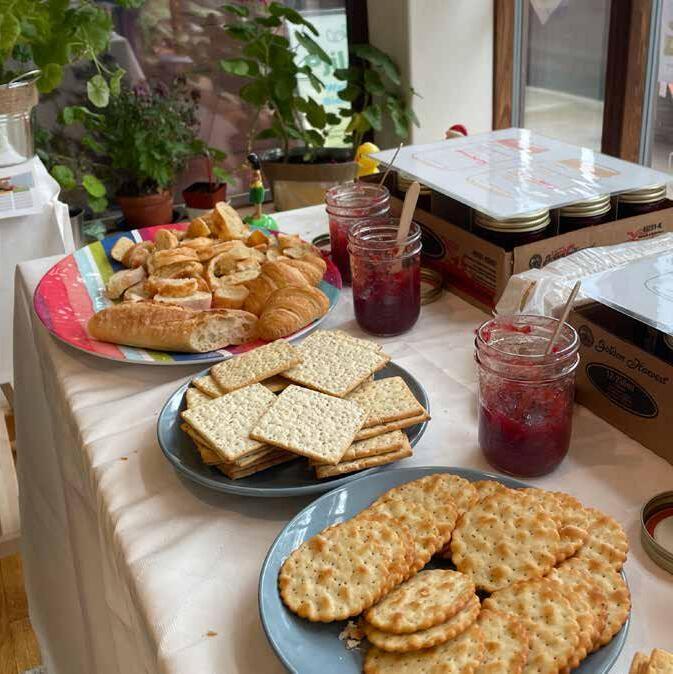

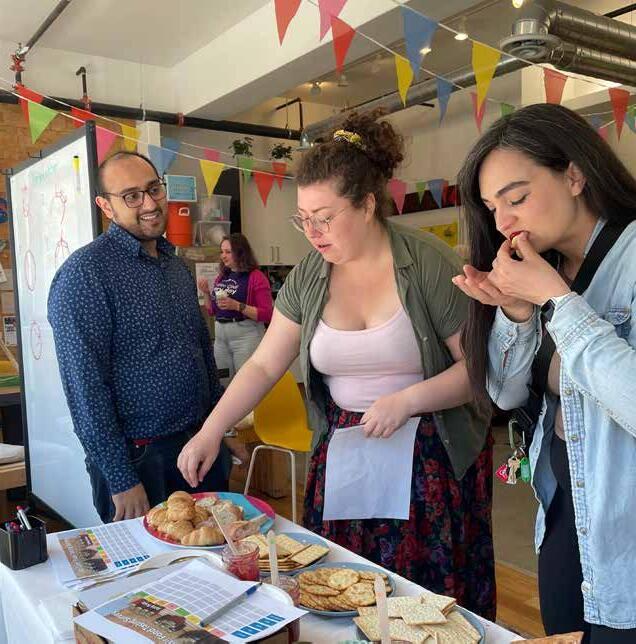

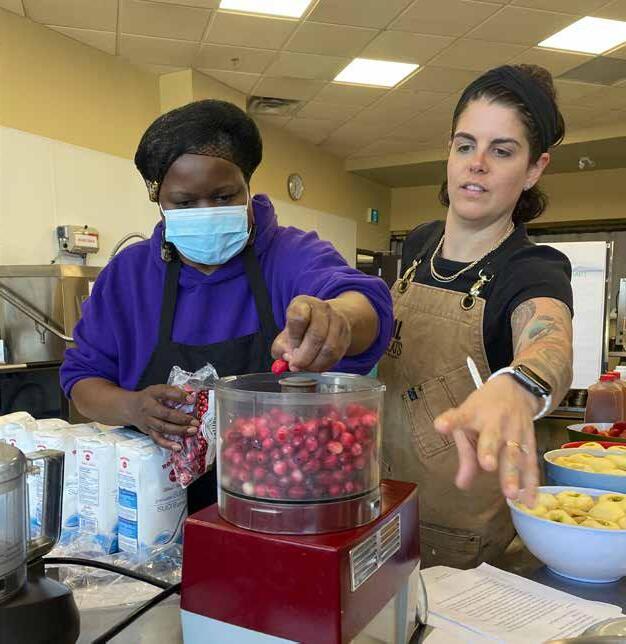
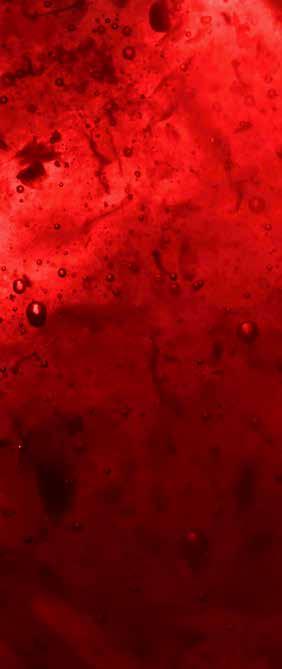
Every One Every Day Kjipuktuk aims to inspire a way of life in neighbourhoods and communities where the things that we value, like relationships, culture, or connection to nature, are reflected in the places we live and the things we do together. And, where reconciliation can be practiced daily, through welcoming opportunities to learn about Indigenous culture and history, spending time together, and sharing across cultures to create a new path forward.
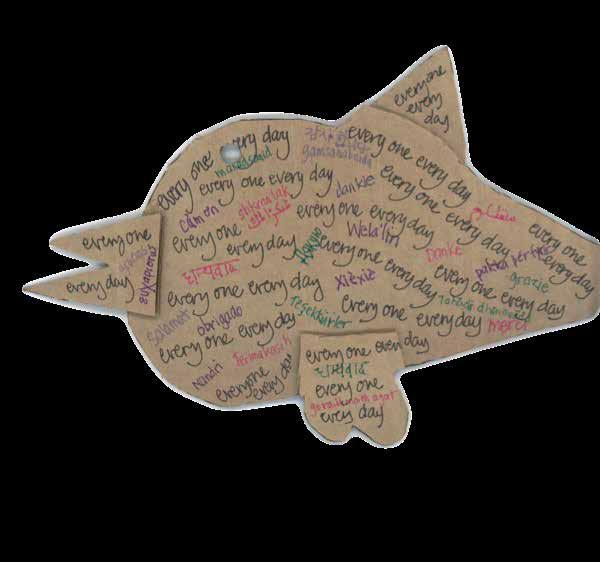
In the short time that Every One Every Day has been operating in Kjipuktuk, we have seen a glimpse of many different residents working sideby-side to bring ideas to life in the neighbourhood while supporting others to take part. We have sparked excitement and curiosity around what life could be like if everyday, there were inviting spaces for neighbours to easily connect, share, learn, and create. At the centre of all of this, we have initiated a journey towards reconciliation in neighbourhoods, sparking our collective imaginations around what’s possible with spaces and opportunities to be together in new ways.
While we hope this is just the beginning, the vision for Every One Every Day rests in the hands of no single individual or organization, but rather, is an invitation for all of us to take part in creating a future society that centres connectedness, healing, regeneration, and where the creative potential of everyone, can be realized.
We are grateful to the many people who have contributed to bring Every One Every Day Kjipuktuk to where it is today.
A special thanks to:

The residents and neighbours of North End Halifax/Kjipuktuk.
Pamela Glode Desrochers (Executive Director, Mi’kmaw Native Friendship Centre)
Tessy Britton (former Chief Executive Officer, Participatory City Foundation)
Jayne Engle and Tanya Chung-Tiam-Fook (Co-Directors, 7GenCities with the Mi'kmaw Native Friendship Centre & Dark Matter Labs)
Michael MacLean & Kieran Stepan (Founding Partners, OSO planning + design)
Every One Every Day Project Team Members (Mi’kmaw Native Friendship Centre):
Aimee Gasparetto, Program Director
Richelle Kantor, Manager of Operations
Tammy Mudge, Manager of Learning and Evaluation
Jocelyn Spence, Coordinator of Communications & Design
Killa Atencio, Neighbourhood Project Designer
Kate Sunabacka, Neighbourhood Project Designer
Nat Quathamer, Neighbourhood Project Designer
Adria Maynard, Neighbourhood Project Designer
Jayme-Lynn Gloade, Collaborative Business Program Designer
Janine Annett, Researcher
With support from staff from the Mi’kmaw Native Friendship Centre.
Funders:
McConnell Foundation
Emera
Atlantic Canada Opportunities Agency
Province of Nova Scotia
Our warmest thanks and appreciation to everyone who has contributed space, inspiration, ideas, and resources, and engaged in the vision of inclusive participation and Reconciliation in Kjipuktuk/Halifax.
Wela’lioq!
